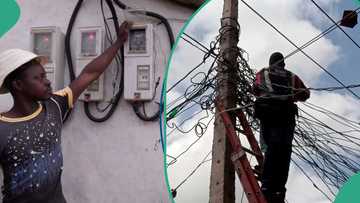Access Bank, GTB, UBA, Six Others Increase Oil And Gas Loans To N15.6 Trillion
- Amid the several economic challenges of 2024, the CBN released data to show that loans and advances to individuals declined
- On the other hand, there is one sector that has enjoyed increased loans from nine banks in 2024
- Experts explain the reason for this increase amid all the challenges facing the sector, and what it implies for the Nigerian economy
Legit.ng journalist Ruth Okwumbu-Imafidon has over a decade of experience in business reporting across digital and mainstream media.
Amid the volatility of the petroleum industry and unstable global oil prices, Nigerian banks are increasing their exposure to the Oil and Gas sector.
Loan exposure from nine Nigerian banks to the oil and gas sector rose from N10.17 trillion in 2023 to N15.6 trillion in 2024.
These banks include all the tier-one banks: First Holdings Plc, United Bank for Africa Plc (UBA), Access Holdings Plc, Guaranty Trust Holding Plc (GTCO), and Zenith Bank Plc.

Source: UGC
Other banks are Fidelity Bank Plc, FCMB Group Plc, Stanbic IBTC Holdings Plc, and Wema Bank Plc.
Gross loans and advances across the nine banks grew by 39.8%, from N38 trillion in 2023 to N53.15 trillion in 2024.
The nine banks also earned a combined N14.26 trillion in interest income in 2024, nearly double their earnings from the previous year.
Banks increase loan exposure to oil and gas
The growth in loan provisions to the oil and gas sector is in line with the Central Bank of Nigeria (CBN) prudential guidelines for key sectors in the Nigerian economy, This Day reports.
Despite the growth in loan exposure, data from the National Bureau of Statistics shows that the sector only recorded a modest performance in Q4 2024, contributing 4.6% to Nigeria’s real GDP.
According to the 2024 unaudited results, here are the top three banks with the highest loan exposures above N2 trillion.

Read also
Investors worried as Discos are unable to collect N54 billion in electricity bills from consumers
- Zenith Bank increased from N2.11 trillion in 2023 to N4.11 trillion in 2024, a growth of 94.4%.
- First Holdco increased by 53% from N2.19 trillion in 2023 to N3.34 trillion in 2024.
- Access Holdco increased by 41.3% from N1.46 trillion in 2023 to N2.07 trillion in 2024.
For First Holdco, the Non-Performing Loans ratio increased from 4.7% to 10.2%, well above the CBN’s 5% requirement.
The bank’s management stated that the growth was primarily driven by one oil and gas loan, without which the NPL ratio would have been around 5.4%.
Nigeria’s oil and gas sector grapples with rising challenges
Meanwhile, Nigeria’s oil and gas sector faces ongoing challenges, including pipeline vandalism, crude theft, and operational inefficiencies.
There has also been a slight recovery in oil prices, but the lingering war between Russia and Ukraine affected Nigeria’s crude oil inflow in the international oil market, with a dip in demand from the once-dependable Asian market.

Source: Getty Images
Mr. Tominiyi Owolabi, Managing Director of Olaniwun Ajayi LP, noted that while divestments and acquisitions reshaped Nigeria’s oil and gas sector in 2024, the industry remains resilient.
He said;
“We are witnessing an uptick in Foreign Direct Investment (FDI) and the government’s push for a greener energy landscape through initiatives like the National Gas Expansion Programme, which underscores the country’s focus on positioning gas as a critical bridge in the energy transitions.”
Bank loans to individuals declined in 2024
In related news, the Central Bank of Nigeria has disclosed that consumer credit in Nigeria dropped to N3.5 trillion in October 2024.
This represented a 17.6% or N750 billion month-on-month (MoM) decline compared to the N4.25 trillion reported in September 2024.
Legit.ng reported that bank lending to the government surged by 89% in the same period, reaching N42 trillion.
Source: Legit.ng



